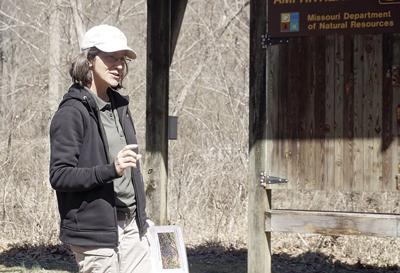Missouri, as a state, shows great reverence and value for the natural resources within its borders. And Missourians have collectively chosen to continue showing that reverence by propping up organizations that uphold that stated purpose.
The mission statement of Missouri State Parks is, “To preserve and interpret the states’ most outstanding natural landscapes and cultural resources, and to provide outstanding recreational opportunities compatible with those resources.”
For Montauk State Park’s new naturalist, Kristie Nelson, that mission statement aligns with her own personal code, and her job description as well.
“My previous job entailed working as a biologist,” she said. However, she said that she also did a lot of public field trips and interpretive programs.
“I was thrilled to be hired on as park naturalist at Montauk – to continue the sorts of work I had done but in this new Ozarkian setting,” she said.
Nelson graduated with a degree in wildlife biology from Humboldt State University in California and went on to work with a non-profit bird research organization called Point Blue Conservation Science. Nelson spent 20 years at Point Blue working on numerous bird-related projects, most prominently managing a long-term research project monitoring gulls in Mono Lake (California), which is a saline lake similar to the Great Salt Lake and is somewhere around two-and-a-half times as salty as the ocean. Her research subjects also included butterflies, beetles, and other insects.
Nelson said that one of the things that drew her to the Ozarks, since moving to the region over a year ago, is the amount of public lands and how well preserved the natural resources are.
“I’m really thrilled to continue learning and exploring as much as I can in this new area,” said Nelson. Nelson hopes to use that knowledge to continue conservation efforts through her work at Montauk State Park.
The part of California that Nelson moved to Missouri from is rural, mountainous and arid. She often says that she is from Nevada which is partially true, since most of her town-related activities would take her just across the state border on a regular basis. Nelson says that gives people a better idea of the kind of area she lived and worked in.
“A lot of times people hear that you’re from California and immediately think you’re from the city,” said Nelson. According to her, that’s not true at all. That part of California is even more rural than most of the Ozarks. So, Nelson is not new to rural country life; however, the terrain is very different from what she’s used to. Subsequently those differences make for an entirely different ecosystem.
“I didn’t know very much about Missouri when I moved here,” said Nelson. “It’s been very broadening to move to another part of the country, and I love it” she said.
Nelson said that people often think that she would be nostalgic for the west, but she said that she’s really not.
Nelson said that she has a high view of Ozarkians.
“The people here are industrious and resourceful,” said Nelson. Nelson also pointed out how integral husbandry with nature is to the people here. “Farming and ranching is still a big part of peoples’ lives here,” said Nelson. Nelson likes that many people have other careers but also still rely on the land to provide for them. That’s another reason that Nelson was drawn to the area.
“Out west, there’s a lot of big agriculture and occasionally you’ll see some smaller ones, but not like here,” she said.
“People are very connected to the land [in the Ozarks],” she said. “There’s a lot of local knowledge people have about their landscape, and as a park naturalist who works to restore and interpret the park’s natural landscapes, I appreciate that commonality,” she said.
Nelson values gaining and implementing new knowledge as well as sharing that knowledge with others—so her new position as the naturalist at Montauk State Park suits her calling well.





